Hello Poolside Repair fans, in this episode Matt and Rob welcome Dan Dougher Inyo’s ppool guru to show us how to install an above ground pool. Dan has almost thirty years of experience installing and repairing above ground pools; fortunately, he shares his methods and tips for making your pool build a success.
Part One – Picking and Prepping the Site, (0:50 – 6:42)
Selecting the Site of Your Pool

- Pick spot preferably away from trees.
- Stake center and mark out the radius of round pool with spray paint. Add a foot to the radius measurement for extra room to lay downn and adjust the pool frame.
Prepping Site

- Use sod cutter or trawler and shovels to remove grass and topsoil.
- Set aside the removed topsoil, this can be used to between sod and pool wall.
- Before and during flattening the ground, remove rocks, roots, and any other soil features.
- This step may take the longest, but it is considered one of those most important.
- Use a builder’s level or transit to level ground.
Part Two – Prepping the Pool, (6:43 – 9:55)

- For round pools, use tape, and a measuring tape fastened to the center stake to dig tied to the center stake, dig a ditch wherein the bottoms rims and plates will be place
- Late out the pool’s bottom rims and bottom plates to confirm count and size
- Connect the bottom rims and plates
- At each bottom plate measure to its opponent on the other side pool. Confirm that the pool dimensions and diameter for each pair are within an inch.
Part Three – Leveling and Stabilizing the Bottom Track, (9:56 – 13:49)

We will be placing the bottom plates on brick pavers to stabilize them
- Use level to balance the bottom track rather than the paver; this will provide an overall better result in keeping the pool level
- Dig out dirt from under the brick to place the paver, and place the plate on the paver. Repeat this step with the next bottom plate and paver.
- Use the level to confirm the two pavers and plate are level. Adjust as needed.
- When the paver installation is complete. Check level between first paver and last paver to confirm level. If the level is off you may have to adjust many if not most of the pavers, because the sum unbalancing may be due to several blocks being slightly off adding up to the error.
- Use builder’s level or transit to reconfirm overall measurements
Part Four – Finish Leveling Ground and Remove Debris, (13:50 – 18:04)

With the track in place, we can now level the ground to the track itself. This makes for a better assessment that all ground is flat and level.
- This also gives us a chance to double down on efforts to remove rocks, pebbles, roots before installing our liner pad and liner.
- When forming the pool’s floor, aim for a dish shape bottom, so debris sheds to the middle for easier cleaning
Part Five – Installing the Pool Wall, (18:05 – 19:25)

Our wall is one rolled sheet if your pool has slatted wall panels you installation will differ.
- Insert the wall into the bottom rim track, while another person is sliding the uprights into place. We use spring clamps to keep the wall in place temporarily. The wall won’t be permanently secure until the top rims and ledge are secured.
- Secure the ends of the wall at the stainless steel strip. Duct tape the inner wall to cover the bolt heads to protect the
Part Six – Pool Cove and Liner Pad Installation, (19:26 – 23:23)
Peel and Stick Cove

- Peel off plastic wrap backing and apply to the base of the wall.
- Before laying out the liner pad, apply a layer (or two) or nutgrass killer. Nutgrass is a big enemy of a/g pool liners.
- Lay out the liner pad; The pad does not need to cover the cove, but it should cover any bare ground
- Unibead liner installation using spring clamp, tack the liner in place to each upright
- As one person attaches the liner to the pool wall, another person can install the previous section’s top rim.
Before installing the liner pad, we take the extra step of putting down a layer of nutgrass killer. This prevents future outbreaks of nutgrass, which is one of the tougher liner enemies to get rid of.
Liner Pad

- Roll out liner pad. Adjust pad to be as wrinkle free as you can.Any bumps or folds may press through the liner to get a bump look.
Part Seven – Install Liner – Unibead, (23:24 – 27:32)

Pro Tip: Warm vinyl stretches easier, making it more pliable during installation. Install liner on a warm day, or unroll the liner to let it set in the sun for a half hour before installation.
- Lay out the liner in the base of your pool
- Use spring clamp to hold the liner in place along the wall.
- With one person on the inside connecting attaching the liner to the wall, another person on the outside can place a top stabilizer on the liner lip, to hold it in place. Follow this procedure around the whole pool.
- Use a garden hose to beginning filling the pool. As the pool is filling, begin to smooth out liner floor wrinkles. Press wrinkles from the center of the pool towards the walls.
- Remove wrinkles liner floor while using a garden hose to begin filling the pool.
- The second person out of the pool will begin installing top stabilizers and top plates.
Part Eight: Installing Stabilizer, Skimmers, and Return, (27:33 – 31:08)
Top Stabilizer

- Your pool model top stabilizer and cap installation may vary from ours, follow your owner/installation manual.
- Before moving onto the next upright, using level to confirm the upright with the newly installed top cap is perfectly vertical
Skimmer
- When the water level is halfway up the wall, it is safe to begin installation of the skimmer
- Align the skimmer faceplate and skimmer body with the wall’s pre-cut skimmer hole, then secure faceplate and skimmer body to wall with provided screws.
- Use Exacto knife to trim skimmer hole in the liner.
Return
- Push return threaded adapter through the pool’s wall’s cutout, stretching the vinyl liner
- Use Exacto knife, to cut opening in stretched vinyl, then push through adapter,
- Cut the excess nut vinyl from the adapter threads, place gasket, and screw on nut
Part Nine: Pump and Filter Installation, (31:08 – 31:24)

- Use pipe clamps to attach hose from skimmer to intake port of the port and the outport of the pump to the return line
- Plug pump into an electrical receptacle.
- When pool water is halfway up the skimmer face, test pump.

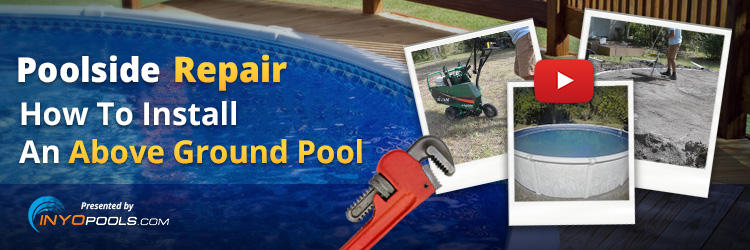



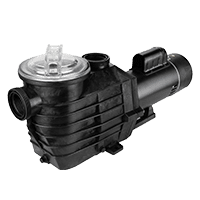
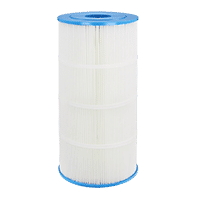
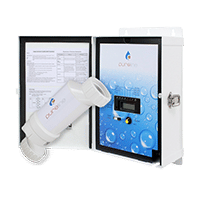
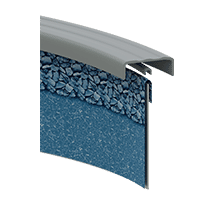

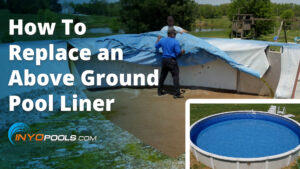

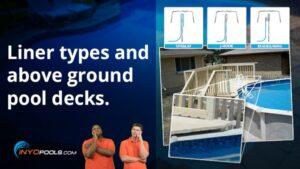
Leave a Reply